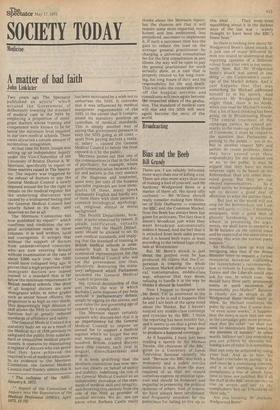Broadcasting
Bias and the Beeb
Bill Grundy
There are, I am reliably informed, more ways than one of killing a cat. There are also more ways than one of making a fool of yourself, and Mr Anthony Wedgwood Berm is a master of them all. His latest silly outburst — Mr Wilson should really consider making him Minister of Silly Outbursts — concerns the BBC and the Common Market. Now the Beth has always been fair game for politicans. The fact that it doesn't broadcast just what they want broadcast automatically makes it biased. And the fact that it is attacked from both sides proves that it is biased both ways, at least according to the twisted logic of the lads at Westminster.
But Mr Benn's attack is just about the pottiest even he has produced. He claims that the Corporation is treating the whole Common Market debate in a cynical, contemptuous, middle-class way, whatever that may mean, refusing to handle it in the way he thinks it should be handled.
Now I happen to disagree with Mr Benn. I'm as interested in the debate as he is and it happens that he and I are both of the same mind about the Market. But I haven't noticed any middle-class contempt and cynicism by the BBC. I think the reporting has been notably fair, and it seems to me that a great deal of responsible thinking has gone to produce a balanced coverage.
As it happens, I have just been reading a speech by Sir Michael Swann, the chairman of the BBC, given to a University of Leeds Television Seminar recently. He said, "Because the BBC was both a monopoly and a public service institution it was, from the start, required of us that we should ourselves express no political opinions and should be balanced and impartial in presenting the political opinions of others. And, of course, we have always been scrutinised, and frequently attacked, by the politiciaas for failing to live up to this ideal . . They were even squabbling about it in the darkest days of the last war — widely thought to have been the BBC's finest hour."
So there is nothing new about Mr Wedgwood Benn's latest attack. It is just one of many delivered by men too stupid to understand that reporting opinions of a different colour from your own is not necessarily bias. But Mr Wedgwood Benn's attack was aimed at one thing — the Corporation's coverage of the Market debate. And it just happens that that was something Sir Michael addressed himself to in his speech. And whatever Mr Wedgwood Benn might think, there is no doubt, when you read Sir Michael's words, that a lot of hard thinking has been going on in Broadcasting House: "The central treatment of the campaign cannot be related primarily to the make-up of the House of Commons; it must be related to the question that Parliament is putting to the public — yes or no. But in another respect MPs and parties do create problems. Since they have passed over their responsibility for the decision yes or no, to the public, it may be argued that they have no more inherent right to be heard on the Referendum than any other interested group. But they are our elected representatives. . . . So it would surely be irresponsible of us not to devote a good deal of attention to what the parties think. . . . But just as the world will not stop for the Referendum, nor I am
sure will party r I therefore anticipate, with a good deal of gloomy foreboding, a situation where, in presenting the arguments, we shall have to preserve a 50-50 balance on the central issue and be expected at the same time to overlay this with the normal party balance."
Sir Michael came up with the intriguing idea that if the Prime Minister were to request a formal ministerial broadcast explaining the Government's recommendation to remain in Europe, then the Tories and the Liberals could also ask for one. In which case, -we should have three party pronouncements in quick succession, all presumably pro-Market!" Balance is clearly not as simple as Mr Wedgwood Senn would seem to think. Sir Michael reinforces the point by saying that if some days, "or even some weeks," it happens that the news is such that one side in the campaign gets more prominence that the other "we shall not seek to manipulate [the news] in the interests of balance." In other words, balance isn't just something you can achieve by slavishly following a set of rules. It is something that can only be achieved by using your loaf. And as to bias, Sir Michael concludes by saying, "It is, and must be a continuing concern, and it is an unending source of complaints, a few of which, from time to time, are justified. But if all the staff in the BBC were one day to rise in wrath and say to the complainers 'belt up,' I should be on their side."
Are you listening, Mr Anthony Wedgwood Benn?


























 Previous page
Previous page